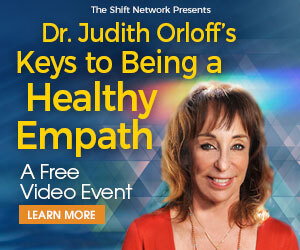
Empathic illnesses are those in which you manifest symptoms that are not your own. Many patients have come to me labeled “agoraphobic” with panic disorders, chronic depression, fatigue, pain, or mysterious ailments that respond only partially to medications or psychotherapy. Some were nearly housebound or ill for years. They’d all say, “I dread being in crowds. Other people’s anger, stress, and pain drain me, and I need a lot of alone time to refuel my energy.” When I took a close history of all these patients I found that they were what I call “physical empaths:” people whose bodies are so porous they absorb the symptoms of others. I relate because I am one. Physical empaths do not have the defenses that others have to screen things out. As a psychiatrist, knowing this significantly changed how I treated these patients. My job became teaching them to center and protect themselves, set healthy boundaries, and let go of energy they picked up from others.
To determine if you are a physical empath take the following quiz.
Quiz: Am I a Physical Empath?
Ask yourself:
* Have I been labeled as overly sensitive or a hypochondriac?
* Have I ever sat next to someone who seemed nice but suddenly my eyelids got heavy and I felt like taking a nap?
* Do I feel uneasy, tired, or sick in crowds and avoid them?
* Do I feel someone else’s anxiety or physical pain in my body?
* Do I feel exhausted by angry or hostile people?
* Do I run from doctor to doctor for medical tests, but I’m told “You’re fine.”
* Am I chronically tired or have many unexplained symptoms
* Do I frequently feel overwhelmed by the world and want to stay home?
If you answered “yes” to 1-3 questions you are at least part empath. Responding yes to 4 to5 questions indicates you have moderate degree of physical empathy. 6 to 7 “yeses” indicate you have a high degree of empathy. Eight yeses indicate you are a full blown empath.
Discovering that you are a physical empath can be a revelation. Rest assured: You are not crazy. You are not a malingerer or hypochondriac. You are not imagining things, though your doctor might treat you like a nuisance. You are a sensitive person with a gift that you must develop and successfully manage.
Strategies to Surrender Toxic Energy:
Physical empathy doesn’t have to overwhelm you. Now that I can center myself and refrain from taking on other people’s pain, empathy has made my life more compassionate, insightful, and richer. Here are some secrets to thriving as a physical empath that I’ve learned so that it doesn’t take a toll on my health.
A Survival Guide for Empaths: 9 Strategies to Stop Absorbing Other People’s Illness and Pain
Evaluate. First, ask yourself: Is this symptom or emotion mine or someone else’s? It could be both. If the emotion such as fear or anger is yours, gently confront what’s causing it on your own or with professional help. If it’s not yours, try to pinpoint the obvious generator.
1. Move away. When possible, distance yourself by at least twenty feet from the suspected source. See if you feel relief. Don’t err on the side of not wanting to offend strangers. In a public place, don’t hesitate to change seats if you feel a sense of “dis-ease” imposing on you.
2. Know your vulnerable points. Each of us has a body part that is more vulnerable to absorbing others’ stress. Mine is my gut. Scan your body to determine yours. Is it you neck? Do you get sore throats? Headaches? Bladder infections? At the onset of symptoms in these areas, place your palm there and keep sending loving-kindness to that area to soothe discomfort. For longstanding depression or pain, use this method daily to strengthen yourself. It’s comforting and builds a sense of safety and optimism.
3. Surrender to your breath. If you suspect you are picking up someone else’s symptoms, concentrate on your breath for a few minutes. This is centering and connects you to your power.
4. Practice Guerilla Meditation. To counter emotional or physical distress, act fast and meditate for a few minutes. Do this at home, at work, at parties, or conferences. Or, take refuge in the bathroom. If it’s public, close the stall. Meditate there. Calm yourself. Focus on positivity and love.
5. Set healthy limits and boundaries. Control how much time you spend listening to stressful people, and learn to say “no.” Remember, “no” is a complete sentence.
6. Visualize protection around you. Visualize an envelope of white light around your entire body. Or with extremely toxic people, visualize a fierce black jaguar patrolling and protecting your energy field against intruders.
7. Develop X ray vision. The spaces between the vertebrae in your lower back (lumbar spine) are conducive to eliminating pain from the body. It’s helpful to learn to mindfully direct pain out of these spaces by visualizing it leaving your body. Say goodbye to pain as it blends with the giant energy matrix of life!
8. Take a bath or shower. A quick way to dissolve stress is to immerse yourself in water. My bath is my sanctuary after a busy day. It washes away everything from bus exhaust to long hours of air travel to pesky symptoms I have taken on from others. Soaking in natural mineral springs divinely purifies all that ails.
Keep practicing these strategies. By protecting yourself and your space, you can create a magical safe bubble around you that nurtures you, while simultaneously driving negative people away. Don’t panic if you occasionally pick up pain or some other nasty symptom. It happens. With strategies I discuss in my book to surrender other people’s symptoms you can have quicker responses to stressful situations. This will make you feel safer, healthier, and your sensitivities can blossom.
Adapted from The Ecstasy of Surrender: 12 Surprising Ways Letting Go Can Empower Your Life, Harmony Books, 2014 by Judith Orloff MD.




